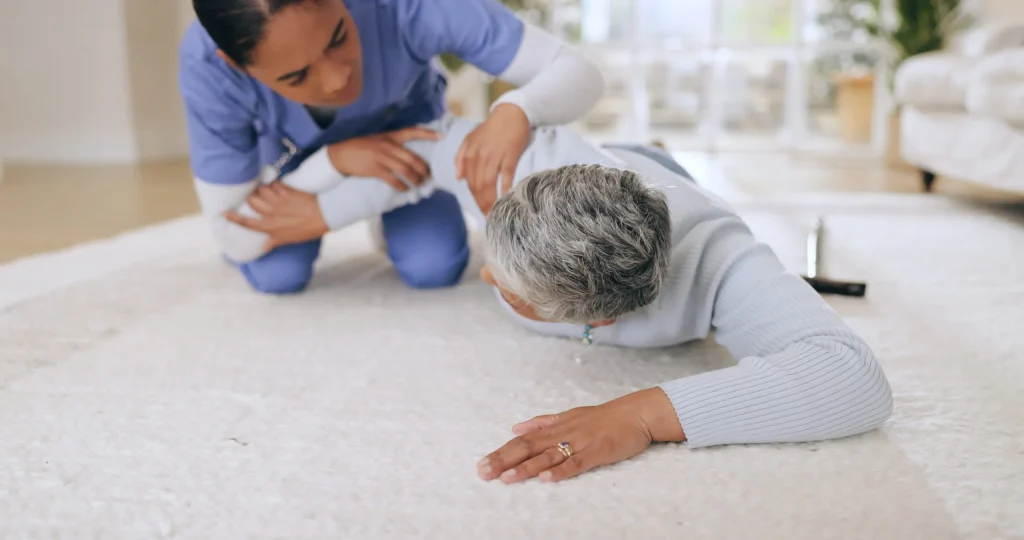
Preventing Accidents in the Home for Elderly: A Complete Guide
The elderly are always at risk of injury and accidents due to their special conditions. This is especially true for people who suffer from certain physical and mental illnesses and problems. For this reason, home safety for elderly is of great importance, because with age, the risks of home accidents such as falls, burns, and poisoning increase. Among the main reasons why home safety is important for the elderly are the preventing accidents in the home for elderly and increasing their independence and quality of life.
Reasons for the increased likelihood of home accidents for the elderly include several things such as: decreased vision, loss of balance in elderly, physical and motor problems, side effects of some medications, lack of concentration, and so on. Falls are one of the most common home accidents that occur in the elderly and can lead to serious injuries such as broken bones. The elderly may be at greater risk of burns due to their reduced sense of smell and vision.
Also, improper use of medications and chemicals can lead to poisoning. Elderly people may be electrocuted due to improper use of electrical appliances. In this article from the Human Health Mag website, we have discussed factors that increase the risk of home accidents for the elderly, strategies for preventing home accidents for the elderly, as well as the role of families, caregivers, and the necessary training in this regard.
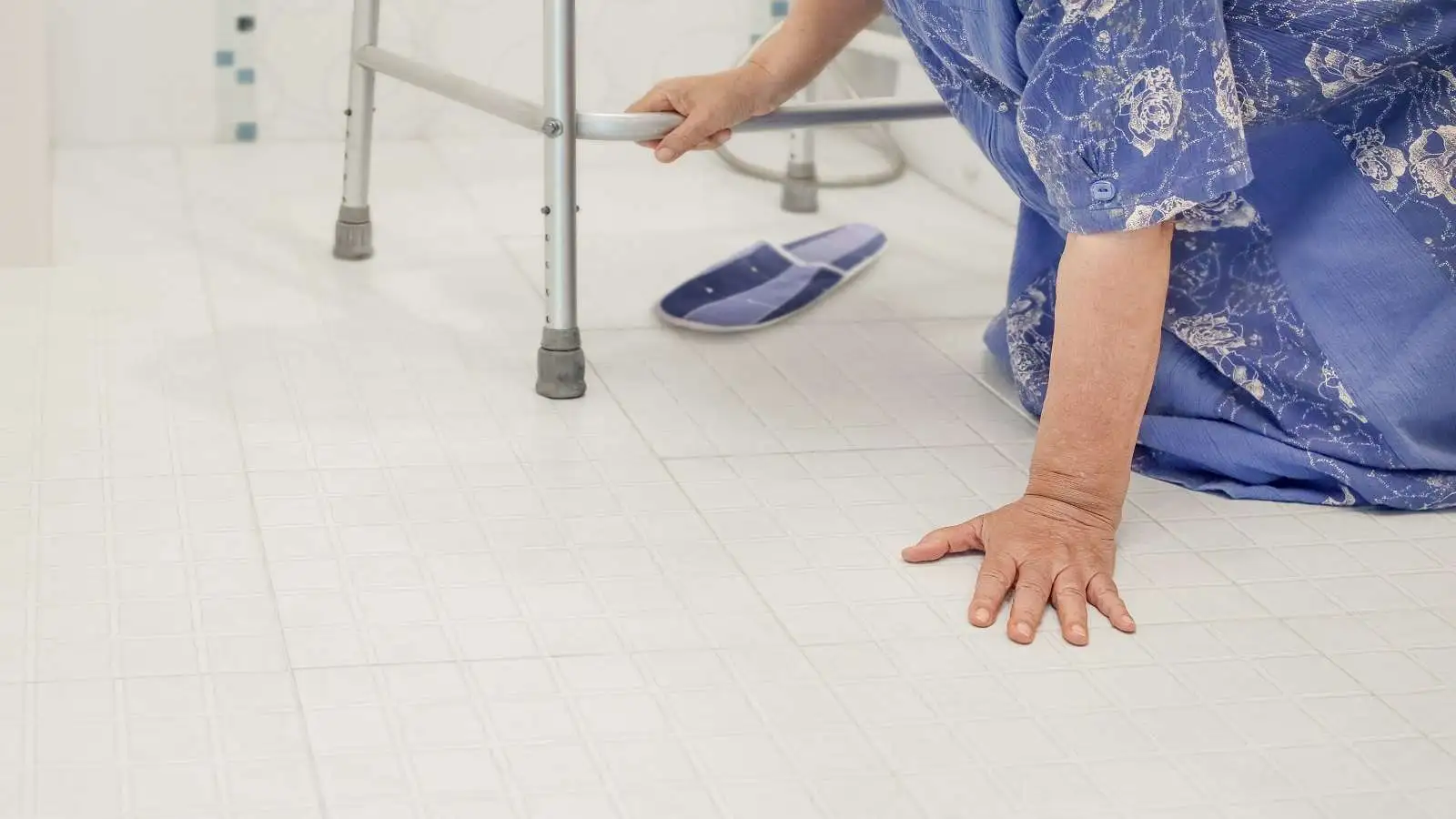
Factors That Increase the Risk of Home Accidents for Elderly
Statistics show that the most common accident for elderly men in cities is traffic accidents, and among elderly women, falling. According to CDC (Centers for Disease Control and Prevention) slipping and falling is one of the main causes of accidents that elderly people experience at home, followed by fire and burns.
Several factors can increase the risk of accidents in the home for elderly. Some of these factors are related to health-related factors, others include environmental factors and some behavioral factors. Paying attention to and eliminating these factors is particularly important in order to maintain the safety of the elderly:
Health-Related Factors in Accidents in the Home for Elderly
Chronic diseases such as arthritis, diabetes, and heart disease can reduce the ability to move and balance in the elderly and increase the risk of accidents. As we age and physical abilities decrease, muscle strength decreases, and flexibility decreases, the risk of falls and other accidents increases.
Some medications may have side effects such as dizziness, drowsiness, and decreased concentration, which can sometimes cause accidents in the home. Reduced sense of smell and vision may prevent the elderly from recognizing and reacting to dangers in time. This can lead to accidents such as burns and poisoning.
Environmental Factors in Accidents in the Home for Elderly
Inadequate environmental conditions such as inadequate lighting for elderly, slippery floors, and the absence of handrails and grab bars can increase the risk of falls and other accidents. The presence of unsafe and exposed electrical wires may also cause accidents in some situations.
Behavioral Factors in Accidents in the Home for Elderly
One of the factors that may cause accidents for the elderly is rushing to do things. Also, the lack of use of mobility aids and devices or home safety equipment for elderly is another factor in causing accidents and incidents that lead to injuries in the elderly.
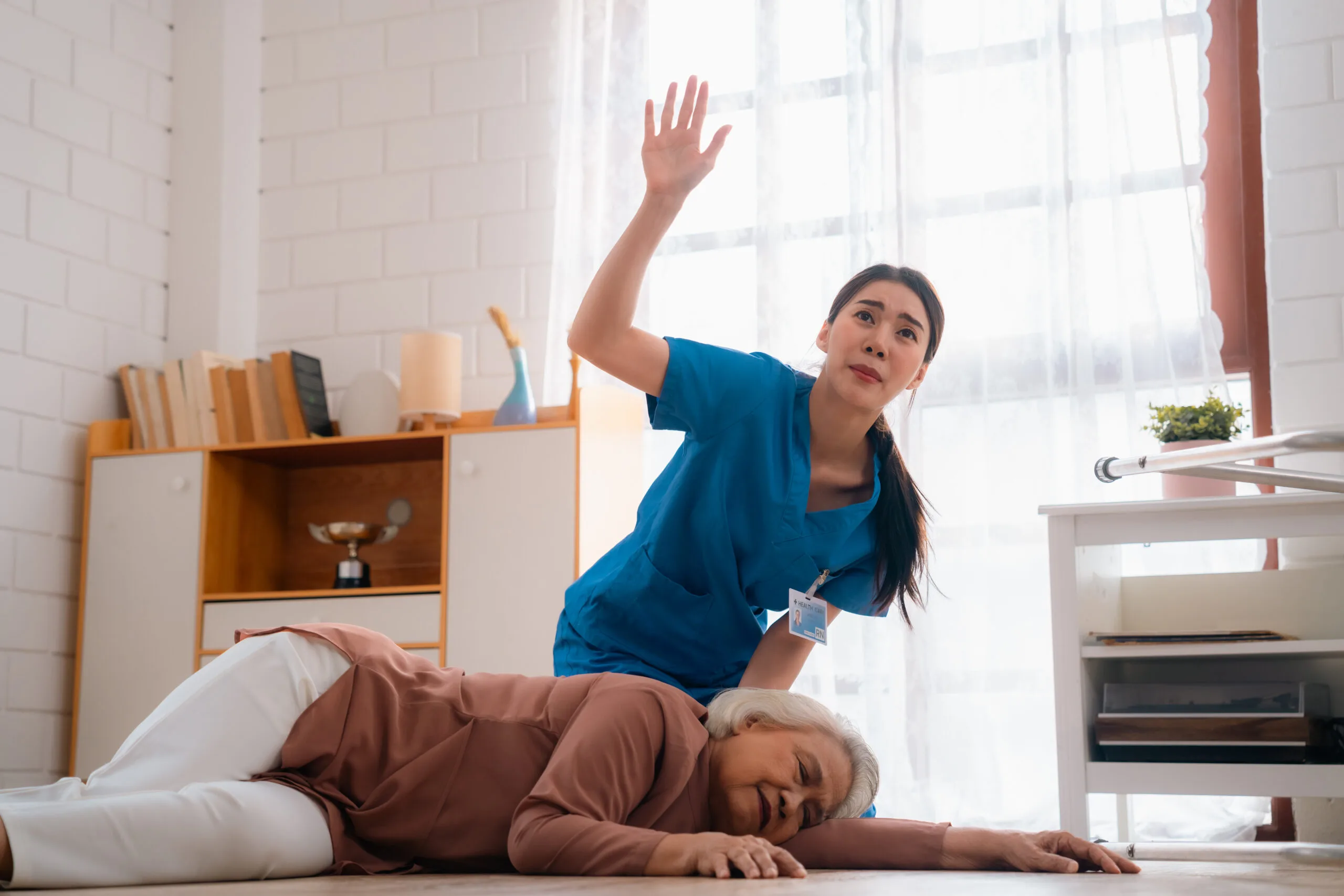
Home Accident Prevention Strategies for the Elderly
How to prevent accidents in the home for the elderly? There are several strategies that can be implemented to minimize potential risks for the elderly. To prevent home accidents for the elderly, the following 5 tips for reducing a senior’s risk of accidents at home can be taken:
1- Home Safety Tips for Older Adults
Making the home environment safe for seniors can help reduce risks and increase their comfort and independence. Important areas in the home that are more likely to cause accidents and need more safety include:
- Kitchen: Use safe gas stoves, non-slip flooring in the kitchen. Also, install handles on cabinets.
- Bathroom: Installing sturdy handles in the bathroom and toilet, using non-slip flooring, and using a bath chair can help increase safety.
- Bedroom: Using a bed of the appropriate height and a bedside lamp in the bedroom can also help. Removing excess objects from the floor can be beneficial.
- Hallways and stairs: Install sturdy handles and railings next to stairs and hallways so that seniors can use them to maintain balance. Sufficient lighting should also be provided in all parts of the home, especially in hallways and stairs, so that the elderly can easily see their way and avoid potential dangers.
2- Choosing the Right Equipment to Protect the Elderly
This can help improving the lifestyle of the elderly and increase their safety. Here are some essential equipment for the elderly to avoid accidents with elderly at home:
- Using mobility aids for the elderly who have mobility problems, such as canes, wheelchairs, or walkers, can help them move more easily and safely.
- Using vision aids for the elderly, such as appropriate glasses, is also very helpful in this regard.
3- Paying Attention to Medications
Paying attention to medications for the elderly is very important in prevention of Injuries in older adults. Because improper use of medications can lead to serious and even dangerous complications. Medications must be taken as directed by the doctor. Also, by consulting a doctor, drug interactions and side effects can be examined and the best solutions can be applied.
Elderly people and their families should be aware of the possible side effects of medications and should see a doctor if any unusual symptoms occur. Another point is that it is better to store medications and chemicals in appropriate places and out of reach of elderly people to reduce the risk of poisoning.
4- Creating Healthy Habits for Seniors
This is beneficial to improve senior quality of life and increase their lifespan. Regular exercise and physical activities such as walking, yoga, and strength training can help improve balance, flexibility, and muscle strength, and reduce the risk of falls.
Eating a healthy, varied, and balanced diet including fruits, vegetables, whole grains, lean proteins, and healthy fats can help maintain a healthy body. Getting enough quality sleep is very important for maintaining physical and mental health. Seniors should try to get between 7 and 8 hours of sleep every night.
5- Essential Training for the Elderly
Among the essential training for the elderly that increases their safety is training in the use of assistive devices. The elderly must know how to properly use assistive devices such as walkers, canes, and wheelchairs so that they can move safely and independently.
Also, due to their special physical conditions, the elderly must receive training in the correct way to get up from their chair or bed. Among other trainings that can be helpful in the field of home accident prevention for elderly, is training on how to use the phone correctly when necessary.
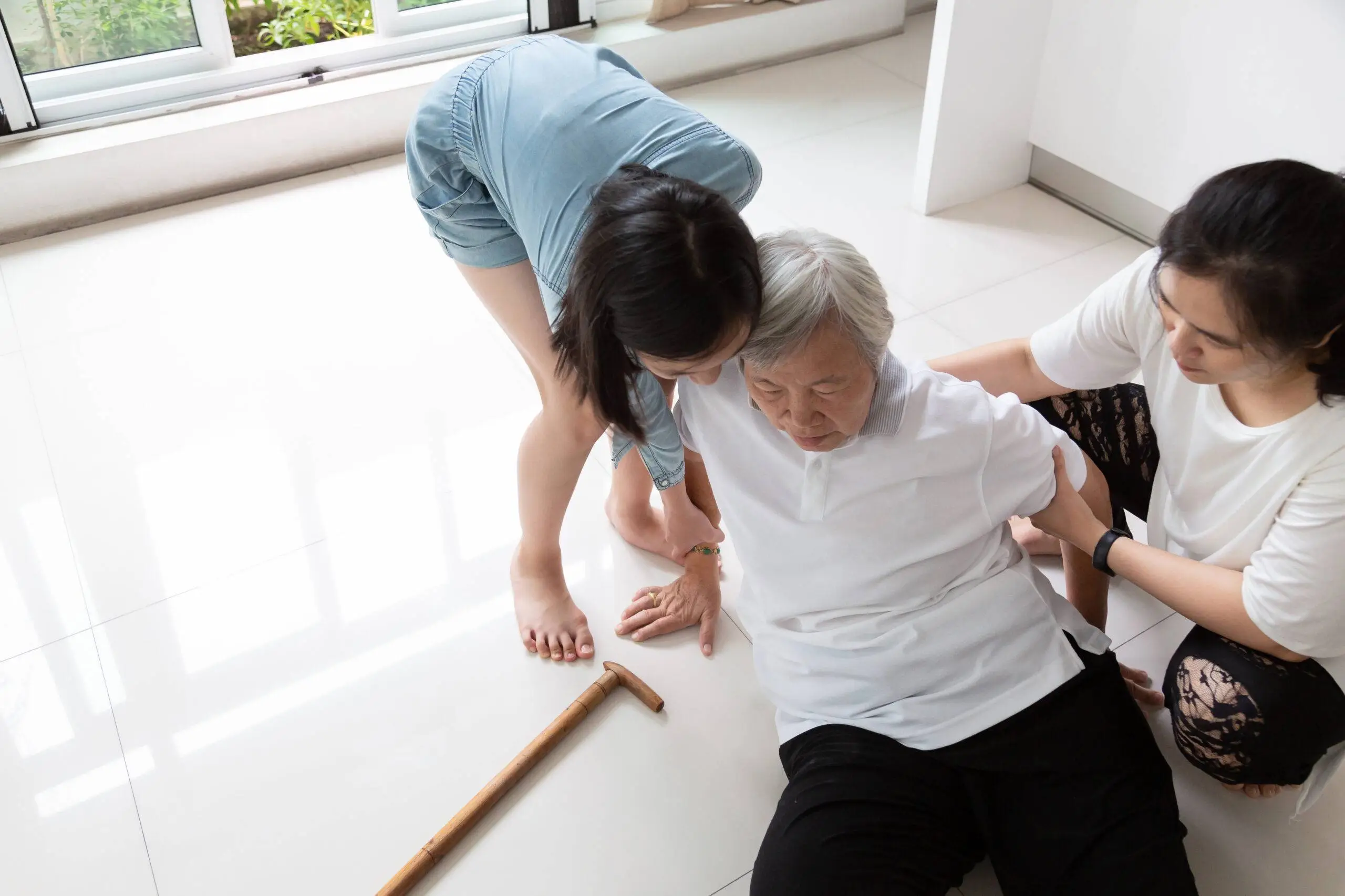
A Guide to Preventing Home Accidents for the Elderly
What are the safety tips for elderly people at home? As we mentioned, older people are more susceptible to accidents at home and on the street due to physical and motor changes caused by aging, including vision loss, hearing loss, poor balance, slow movement, debilitating diseases such as knee arthritis, muscle weakness, medication use, dizziness, confusion, lack of concentration, and inappropriate environmental conditions. To prevent and managing elderly injuries and accidents at home, you need to take steps at home:
- Diagnosis and treatment of disorders that may affect a person’s balance, including diabetes, heart disorders, nervous system, musculoskeletal system, and thyroid.
- Teaching the elderly to do dynamic balance exercises for seniors
- Investigating the use of calcium supplements or hormone replacement therapy in women (because osteoporosis is one of the risk factors for fractures associated with falls)
- Providing behavioral education and training, such as avoiding sudden changes in posture, education related to the prevention of falls
- Review of drug therapy and its side effects
- Evaluation of vision and hearing and other sensory deficits
Home Safety Ideas for Elderly
The following guidelines can be used for home safety and preventing accidents in the home for the elderly:
- All rooms should have adequate lighting, especially when studying
- Do not run electrical cords under rugs
- If you have just washed the floor, never walk on it before it dries
- Carpets on all surfaces should be completely firm and not slipper
- The edges of all carpets should be completely and properly glued and installed
- Light switches should be installed near every entrance
- Lighting levels should be good and diffused without shadows
- There should be a lamp or light switch next to each bed
- There should be a light switch at the top and bottom of the stairs
- The hallway to the bathroom and toilet should be lit at night
- Use a non-slip rubber coating in the bathtub, shower and on the bathroom floor
- Install hooks on the bathroom walls so you can use them while washing
- Keep soap in a container that is easily accessible to prevent you from falling in a place that causes you to slip
- Shoes should always have a good heel and sole that provide good traction
- Avoid walking alone in socks on slippery surfaces in the house
- Use boots or other suitable footwear on snowy and icy surfaces
- Handles of gas stoves should be turned inwards, so as not to hit them when walking
- Flammable and flammable items should be kept away from the gas
- Never bend over a burning appliance
- Clothes with loose sleeves can get caught on pan handles or catch fire from gas flames, so it is better to avoid wearing such clothes when cooking
- Close all drawers and cabinet doors after use
- Put insecticides and cleaning fluids in designated containers and away from food cans
- Install a fire extinguisher in the kitchen
- Clean the grills and oven and stove vents of grease to prevent fires
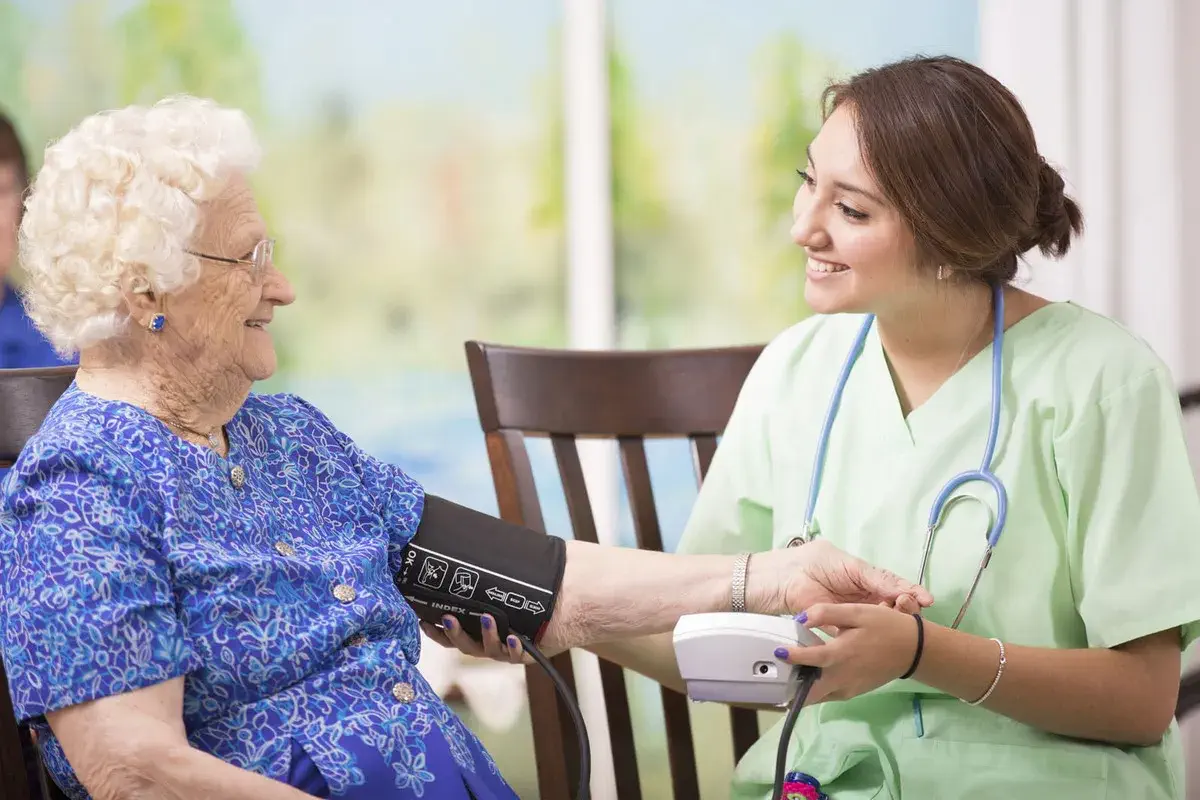
The Role of the Family and the Elderly Nurse in Preventing Accidents in the Home for Elderly
Family and caregivers play a very important role in preventing accidents for the elderly. One of the role of the home care nurse and families is that they should regularly monitor the elderly and check their health status and needs. Monitoring the use of medicines and monitoring the physical and mental condition of the elderly can help prevent accidents. Families should provide a safe and calm environment at home for the elderly by using the mentioned solutions.
Encouraging regular physical activity that is appropriate for the elderly’s conditions is another task that should be done by caregivers and families. Families and those around them should also help and assist the elderly in performing daily tasks. Family presence and intimate communication can prevent the feeling of loneliness, depression and anxiety in the elderly. This support can help increase self-confidence and a sense of security in the elderly.
Regular home inspections to prevent accidents in the home for the elderly, in addition to identifying and eliminating potential hazards, provide a safer environment for the elderly. Because regular home inspections can help identify hidden hazards such as electrical wires in the way of travel, slippery floors, and inadequate lighting. By inspecting and modifying the home environment, falls can be prevented for the elderly. Creating a safe and comfortable environment can be helpful in improving the quality of life of the elderly and increase their sense of security and independence.
Concluding Remarks
In this article from humanhealthmag, we explained the importance of safety in the living environment of the elderly and the factors that cause accidents in the home for the elderly. We also discussed strategies for preventing these accidents and the role of families and caregivers.
We must emphasize that the elderly are more prone to accidents such as falls, poisoning, etc. due to reasons such as muscle weakness, other physical problems, and insufficient concentration. Therefore, it is very necessary to use the necessary measures to create a safe environment for the elderly. By creating a safe environment, the elderly can live more confidently in their homes and maintain their independence. This also helps to improve the quality of life and reduce stress and worries for families.
Do you also have any experience in creating a safe environment for your elderly, please share it with us.

Frequently Asked Questions
Why do seniors have accidents at home?
Lack of balance, physical disabilities, cognitive impairment, confusion, and vision loss are among the main factors in accidents in the home for the elderly.
What is most common home accident for elderly?
Statistics show that the most common accident for elderly men in cities is traffic accidents, and among elderly women, falling.
